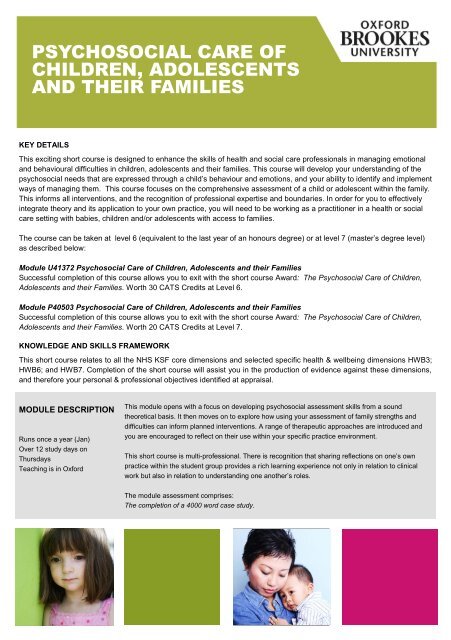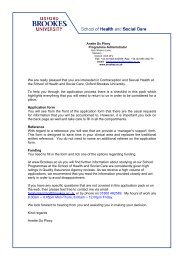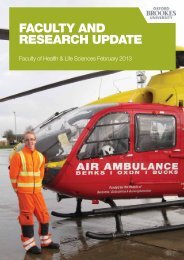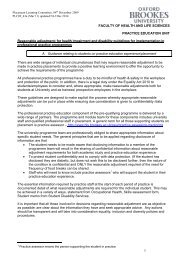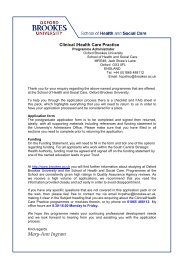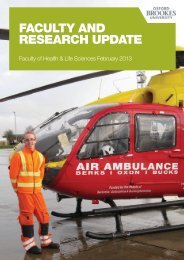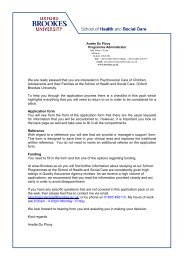psychosocial care of children, adolescents and their families
psychosocial care of children, adolescents and their families
psychosocial care of children, adolescents and their families
Create successful ePaper yourself
Turn your PDF publications into a flip-book with our unique Google optimized e-Paper software.
PSYCHOSOCIAL CARE OFCHILDREN, ADOLESCENTSAND THEIR FAMILIESKEY DETAILSThis exciting short course is designed to enhance the skills <strong>of</strong> health <strong>and</strong> social <strong>care</strong> pr<strong>of</strong>essionals in managing emotional<strong>and</strong> behavioural difficulties in <strong>children</strong>, <strong>adolescents</strong> <strong>and</strong> <strong>their</strong> <strong>families</strong>. This course will develop your underst<strong>and</strong>ing <strong>of</strong> the<strong>psychosocial</strong> needs that are expressed through a child’s behaviour <strong>and</strong> emotions, <strong>and</strong> your ability to identify <strong>and</strong> implementways <strong>of</strong> managing them. This course focuses on the comprehensive assessment <strong>of</strong> a child or adolescent within the family.This informs all interventions, <strong>and</strong> the recognition <strong>of</strong> pr<strong>of</strong>essional expertise <strong>and</strong> boundaries. In order for you to effectivelyintegrate theory <strong>and</strong> its application to your own practice, you will need to be working as a practitioner in a health or social<strong>care</strong> setting with babies, <strong>children</strong> <strong>and</strong>/or <strong>adolescents</strong> with access to <strong>families</strong>.The course can be taken at level 6 (equivalent to the last year <strong>of</strong> an honours degree) or at level 7 (master’s degree level)as described below:Module U41372 Psychosocial Care <strong>of</strong> Children, Adolescents <strong>and</strong> <strong>their</strong> FamiliesSuccessful completion <strong>of</strong> this course allows you to exit with the short course Award: The Psychosocial Care <strong>of</strong> Children,Adolescents <strong>and</strong> <strong>their</strong> Families. Worth 30 CATS Credits at Level 6.Module P40503 Psychosocial Care <strong>of</strong> Children, Adolescents <strong>and</strong> <strong>their</strong> FamiliesSuccessful completion <strong>of</strong> this course allows you to exit with the short course Award: The Psychosocial Care <strong>of</strong> Children,Adolescents <strong>and</strong> <strong>their</strong> Families. Worth 20 CATS Credits at Level 7.KNOWLEDGE AND SKILLS FRAMEWORKThis short course relates to all the NHS KSF core dimensions <strong>and</strong> selected specific health & wellbeing dimensions HWB3;HWB6; <strong>and</strong> HWB7. Completion <strong>of</strong> the short course will assist you in the production <strong>of</strong> evidence against these dimensions,<strong>and</strong> therefore your personal & pr<strong>of</strong>essional objectives identified at appraisal.MODULE DESCRIPTIONRuns once a year (Jan)Over 12 study days onThursdaysTeaching is in OxfordThis module opens with a focus on developing <strong>psychosocial</strong> assessment skills from a soundtheoretical basis. It then moves on to explore how using your assessment <strong>of</strong> family strengths <strong>and</strong>difficulties can inform planned interventions. A range <strong>of</strong> therapeutic approaches are introduced <strong>and</strong>you are encouraged to reflect on <strong>their</strong> use within your specific practice environment.This short course is multi-pr<strong>of</strong>essional. There is recognition that sharing reflections on one’s ownpractice within the student group provides a rich learning experience not only in relation to clinicalwork but also in relation to underst<strong>and</strong>ing one another’s roles.The module assessment comprises:The completion <strong>of</strong> a 4000 word case study.
WHAT STUDENTS HAVE SAID ABOUT THIS MODULE“This course has been an amazing journey. I am glad I have taken this on board as it has enriched my practice.”“I feel I can assess the <strong>families</strong> I look after far better than previously.”“…whole experience has changed my outlook on everything – changed the way I work – I feel very excited.”“Probably the best course I have ever done.”“I would have got a lot more out <strong>of</strong> my <strong>care</strong>er if I had come on this course earlier.”YOUR NEXT STEPAccess to this course is available to all practitioners who meet the following criteria. You must: Be a pr<strong>of</strong>essional working in a health or social <strong>care</strong> setting with babies, <strong>children</strong>, or <strong>adolescents</strong> <strong>and</strong> <strong>families</strong>. Thisincludes:o Pr<strong>of</strong>essionals working outside mental health services in community <strong>and</strong>/or hospital settings: health visitors,<strong>children</strong>’s nurses, school nurses, social workers, play therapists, midwives, neonatal nurses, generalpractitioners, learning disability nurses <strong>and</strong> physiotherapists.o Pr<strong>of</strong>essionals working within mental health services in community <strong>and</strong> hospital settings including all thoseworking in PCAMHS <strong>and</strong> CAMHS: nurses, occupational therapists, play therapists, mental health workers <strong>and</strong>social workers. Produce evidence <strong>of</strong> the ability to study at Level 5 or above if applying for U41372 Have a bachelor’s degree if applying for P40503 (master’s level). Have the support <strong>of</strong> the manager <strong>of</strong> your practice area.If you meet these criteria, your next step is to submit an Oxford Brookes University application form with all thenecessary documents such as references. Applications are dealt with on a first come, first served basis. This is apopular short course so please act early to avoid disappointment.If you are ready to apply please request an application pack where you will find a: ‘Checklist <strong>of</strong> RequiredDocuments.’COURSE FEESFunding arrangements vary across the country. Oxford Brookes University has a contract for this course with someNHS Trusts for a specific number <strong>of</strong> places. Applicants from these Trusts will need the agreement <strong>of</strong> <strong>their</strong> Manager/Education Lead to apply. Other Trusts may elect to purchase the course using <strong>their</strong> flexible funding budget <strong>and</strong>applicants must follow <strong>their</strong> local process for agreeing funding. The cost <strong>of</strong> the course is £1810. This fee is the samewhether studying at level 6 or level 7.If you would like further information <strong>and</strong>/or an application pack, please contact:Gaynor McConnell, Programme AdministratorTel: 01865 482585 or email <strong>psychosocial</strong><strong>care</strong>@brookes.ac.ukFor general information, visit our webpage: hls.brookes.ac.ukOxford Brookes University actively supports equality in education <strong>and</strong> welcomes applications from all people representative <strong>of</strong> ourdiverse community. For more details please visit www.brookes.ac.uk/services/hr/eodor phone +44 (0) 1865 485929.


